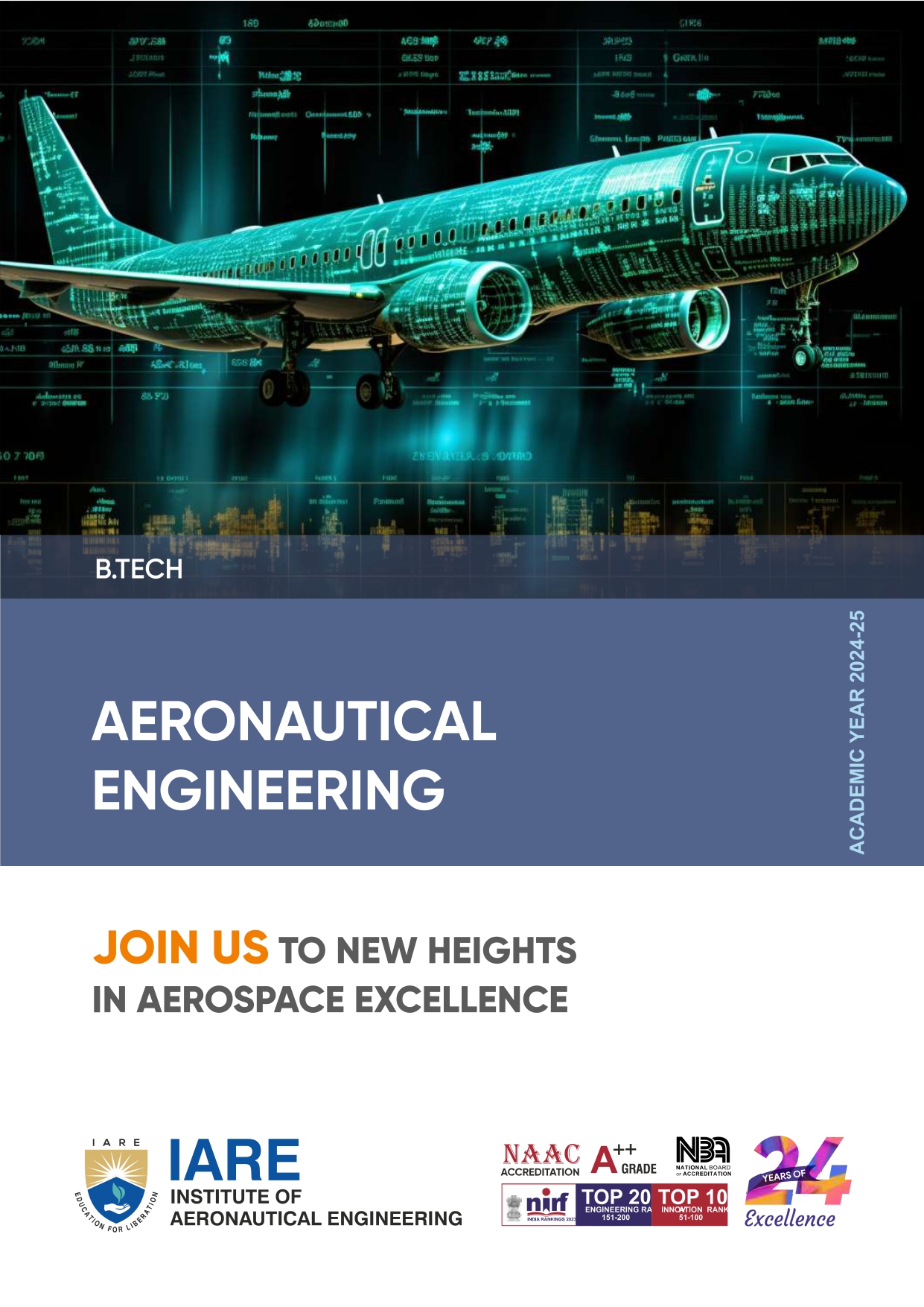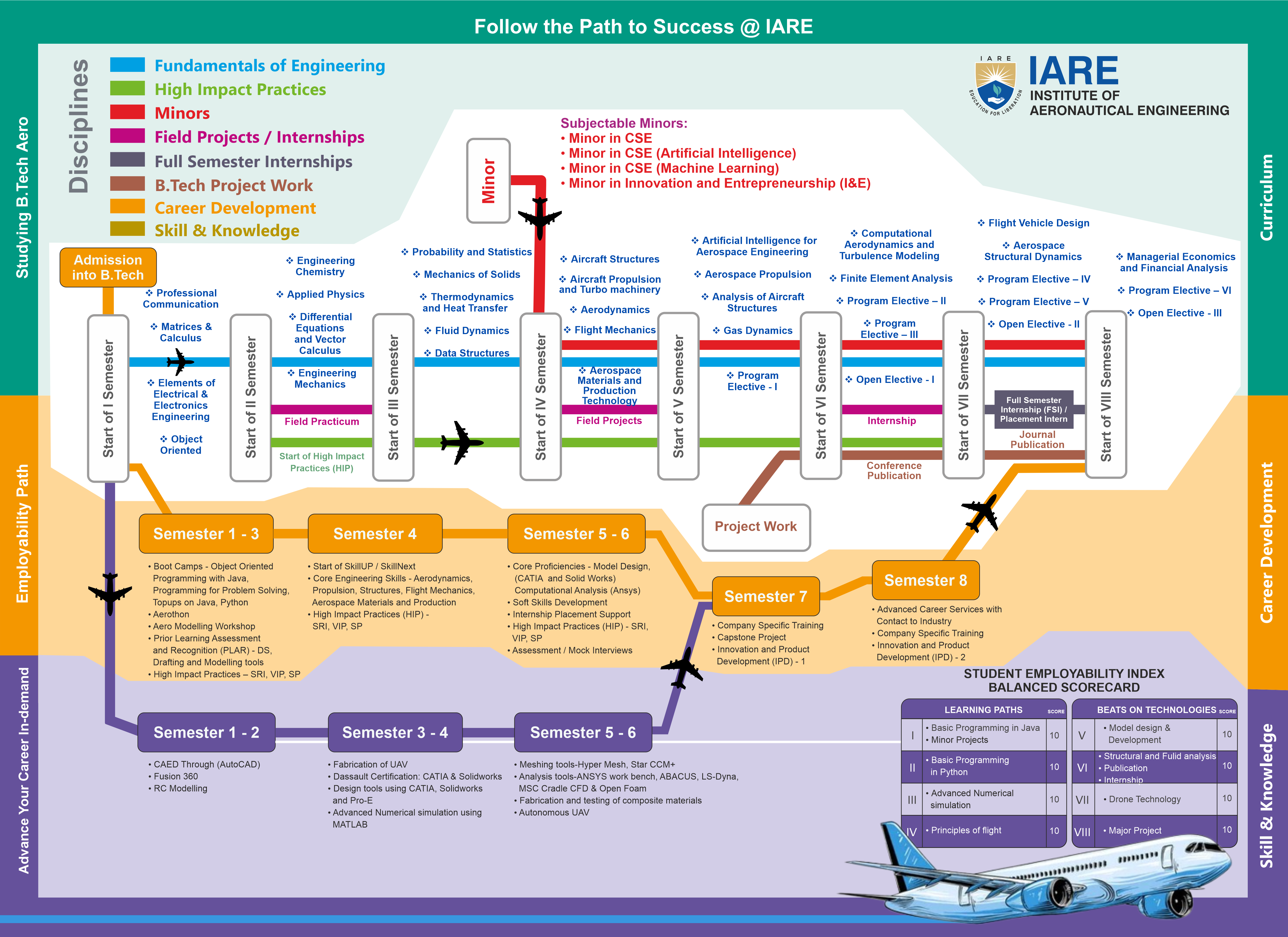Follow the Path to Success in Aeronautical Engineering
At IARE, students follow three key pathways to success: curriculum, career development, and skills and knowledge enhancement.
The B.Tech program in Aeronautical Engineering offers a comprehensive curriculum that integrates core aerospace engineering principles with cutting-edge technologies, emphasizing high-impact educational practices, project-based learning, and hands-on experience in flight dynamics, propulsion, and computational fluid dynamics. The program also provides minor specializations in emerging fields like UAV technology, space systems, and advanced aerodynamics, ensuring graduates possess a versatile skill set for a wide range of aerospace careers.
The Career and Employability Skills (CES) Centre is instrumental in guiding aeronautical engineering students towards successful careers by offering tailored career support, industry-specific training, and mentorship, helping them develop the professional competencies needed for the highly competitive aerospace sector.
The Balanced Scorecard initiative by the Division of Competency Building and Consultancy provides a structured, multi-semester roadmap, integrating industry-aligned certifications, internships, and capstone projects, ensuring students acquire the technical expertise, analytical skills, and professional competencies required for impactful careers in the aerospace industry.
Most Promising Minor Program Tracks Along with B.Tech Degree in Aeronautical Engineering:
- A major is a primary focus of study, typically 160 credits.
- A minor is a secondary focus of study, typically 18 credits.
Specialize in one of the minor programs relevant for the future of engineering
- 1. Space Technology
- 2. Space Vehicle Engineering
- 3. Automation in Robotics
- 4. Artificial Intelligence
- 5. Innovation and Entrepreneurship
1. Space Technology
The minor in Space Technology equips engineering students with foundational knowledge of satellite systems, space missions, and space-based applications. Students learn the principles of spacecraft subsystems, remote sensing, and space communication, enabling them to understand how space technologies support navigation, weather forecasting, Earth observation, and national security. This specialization fosters innovation and prepares students for careers in the rapidly growing space ecosystem.
2. Space Vehicle Engineering
The minor in Space Vehicle Engineering focuses on the design, analysis, and operation of launch vehicles and spacecraft. Students gain exposure to aerodynamics, propulsion systems, structural design, and flight mechanics of space vehicles. This program develops strong analytical and systems engineering skills, preparing students to contribute to launch vehicle development, satellite deployment, and advanced aerospace missions.
3. Automation in Robotics
The minor in Automation in Robotics provides students with hands-on knowledge of robotic systems, sensors, control mechanisms, and industrial automation. Learners explore robot programming, intelligent control, and autonomous systems used in manufacturing, healthcare, logistics, and smart infrastructure. This specialization enhances problem-solving and interdisciplinary skills, enabling graduates to design automated solutions for modern engineering challenges.
4. Artificial Intelligence
The minor in Artificial Intelligence equips engineering students with the ability to develop intelligent systems using machine learning, data analytics, and computational intelligence techniques. Students learn to design AI-based solutions for real-world applications such as automation, predictive analysis, image processing, and smart decision-making systems. This specialization promotes analytical thinking and innovation, preparing graduates to address complex engineering challenges across diverse industries.
5. Innovation and Entrepreneurship
The minor in Innovation & Entrepreneurship empowers civil engineers to transform technical ideas into viable products, startups, and scalable solutions. The curriculum focuses on design thinking, problem identification, business model development, intellectual property rights, and startup financing, with applications in construction technology, sustainable infrastructure, and smart cities. This specialization nurtures leadership, creativity, and an entrepreneurial mindset essential for driving innovation in the future engineering ecosystem.
IARE services for career development in Aeronautical Engineering
WE HELP OUR STUDENTS TO GAIN THEIR FIRST PROFESSIONAL WORK EXPERIENCES.
The Career Development Division at IARE is dedicated to enhancing the employability of aeronautical engineering students, equipping them with the specialized skills required for successful careers in the aerospace industry. We provide comprehensive support to help students achieve their career goals through well-structured programs like Skill Next, Skill Bridge, and Skill Up, designed to match industry demands and build essential competencies.
Practical Training - Specialized boot camps for aerospace software like ANSYS Fluent, CATIA, MATLAB, and SolidWorks. Participation in aerospace hackathons and design competitions, such as SAE Aero Design and AIAA Design Competitions.
Techniques to Build a Professional Portfolio - Maintaining technical profiles on platforms like LinkedIn, GitHub, and ResearchGate to highlight design skills and computational expertise.
Personal Career Guidance - One-on-one mentoring to bridge technical skill gaps and prepare for roles in R&D, manufacturing, and aerospace consulting. Guidance on selecting aerospace certifications like CAE (Certified Aerospace Engineer) and CFD Specialist for career growth. Professional networking support through industry visits, guest lectures, and alumni interactions.
Online Events and Trainings - Prior Learning Assessments (PLA) in Data Structures, flight mechanics, propulsion, and structural analysis. Intensive programming practice sessions on platforms like Leetcode, GeeksforGeeks, HackerRank, and CodeChef for aerospace applications. Virtual workshops on cutting-edge topics like Hypersonic Flows, Composite Materials, and Aerospace Control Systems.
Finish Strong with Us! - Prepare for industry roles through advanced competitive coding, technical writing, and hands-on aerospace projects. Gain exposure to practical aerodynamics, wind tunnel testing, and UAV design challenges.
Supplementary Studies - High-impact learning through aerospace internships, research projects, creative assignments, and certifications in emerging areas like Space Systems, Unmanned Aerial Systems (UAS), and Additive Manufacturing.
Integration, Career Support, and Networking - Build strong industry-academia ties with leading aerospace organizations like ISRO, DRDO, and HAL. Engage in technical clubs, conferences, and student chapters of professional bodies like AIAA and SAE International for long-term professional growth.
IARE Focus on Career In-Demand
Career Planning already during your studies: We will support you
The Competency Building and Consultancy Division at IARE offers a wide range of activities and resources to support the career growth of aeronautical engineering students, helping them navigate the rapidly evolving aerospace industry. From technical training to professional mentorship, we ensure our students are industry-ready with the skills needed for impactful careers in aerospace.
Mid-Career Consortium - Preparing for advanced aerospace technologies such as Computational Fluid Dynamics (CFD), Finite Element Analysis (FEA), UAV Design, Hypersonic Flows, and Spacecraft Dynamics. Specialized training in industry-critical software like ANSYS Fluent, CATIA, MSC Nastran, and MATLAB/Simulink. Focus on cutting-edge areas like Propulsion Systems, Avionics, Aeroelasticity, and Aircraft Structures.
Career Monitoring - Student Employability Index through Balanced Scorecard metrics, tracking student progress in technical skills, project experience, and industry readiness. Regular assessments to ensure alignment with aerospace industry requirements and career goals.
Special Interest Curriculum - Customized, industry-specific modules in Space Systems Engineering, UAV Operations, Aerospace Manufacturing, and Flight Dynamics. Certifications in specialized areas like Composite Structures, Aeroacoustics, and Aircraft Systems Integration.
Professional Development - Hands-on training in career readiness through workshops, industry mentorship, and technical simulations. Support for participating in aerospace design challenges like AIAA Design Competitions, SAE Aero Design.
Career Advancement - Advanced technical training in areas like Aerodynamics, Propulsion, Structural Mechanics, Flight Testing and Aerospace Systems Design. Industry-aligned certifications, professional networking and entrepreneurial support for aspiring aerospace leaders.
Visiting Employer Programs - Bridging the gap between academia and the aerospace industry through on-campus sessions with industry leaders, alumni employer engagement, and guest lectures from leading aerospace professionals.
Accelerated Courses - Fast-track career pathways, including the option for a Full Semester Internship in the VII/VIII semester at leading aerospace organizations. Support for students who receive early job offers or internships, allowing them to work before completing their degree for real-world experience.




 Work with Us
Work with Us Campus Map
Campus Map How to Reach Us
How to Reach Us Online Degree Verification
Online Degree Verification Photo Gallery
Photo Gallery